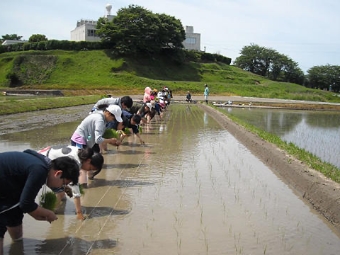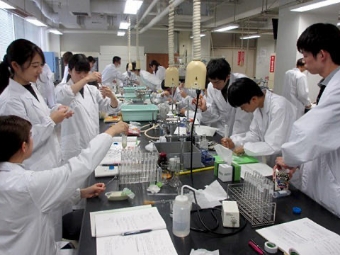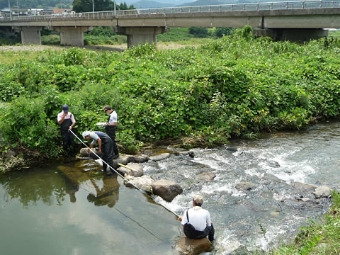department of agriculture
Building a sustainable society that coexists with nature
The Faculty of Agriculture aims to develop human resources with expertise and skills in the development of biological production technology and the stable supply of safe and secure food, the elucidation of biological functions and the utilization of biological resources, and the creation, restoration, conservation, management and utilization of the biological environment. The Faculty of Agriculture aims to foster human resources who can solve various problems related to food, life, and the environment from regional and international perspectives, and contribute to the construction of a sustainable society that coexists in harmony with nature.
Department Overview
Department of Food Production Science
Development of Biological Production Technology and Stable Supply of Safe and Secure Food
The Department of Food Production conducts education and research on plant production in fields, cultivation facilities, and plant factories, and on the processes of distribution, storage, processing, and marketing of harvested products, in order to realize “development of biological production technology and stable supply of safe and secure food” which the agricultural science field should take on. The program also conducts education and research on the “6 key technologies” that are in high demand in society. In addition, in order to respond to the social need for “6th industrialization,” a wide range of knowledge is required from cultivation, harvesting, distribution, storage, processing, and marketing, and in order to respond to “smart agriculture,” state-of-the-art ICT, plant biometrics, and computer analysis technologies are required. From the viewpoint of human resource development, the program will be based on botany, agronomy, ecology, and biological environment regulation, to which will be added molecular biological knowledge and methods, sociological knowledge and methods such as business administration and field research, to teach a wide range of knowledge and technologies necessary for various forms of food production, from environmentally friendly agriculture to plant production using plant factories, to ensure stable food production. We also teach the wide range of knowledge and techniques necessary for various forms of food production, from environmentally friendly agriculture to plant production using plant factories.

Department of Bioscience
Elucidation of Biological Functions and Utilization of Biological Resources
Life science, which is based on biotechnology, is a field of study that is expected to contribute to various areas related to life, such as healthy living and the achievement of a healthy and long-lived society through the analysis of life phenomena. The Department of Bioscience and Biotechnology aims to develop from the basic field of elucidating life phenomena at various levels, from molecules such as organic compounds, proteins, nucleic acids, and enzymes to microorganisms, animal and plant cells, and even individual organisms, using chemical methods, to the applied field of creating innovative technologies using biotechnology and developing functional foods and pharmaceuticals. The Department of Biotechnology and Life Science conducts education and research with the aim of expanding into applied fields such as the creation of innovative technologies using biotechnology and the development of functional foods and pharmaceuticals. We contribute to society by elucidating biological functions and effectively utilizing biological resources. The Department of Life Science aims to cultivate human resources who can play an active role in a wide range of biotechnology-related industries, such as food, chemistry, and pharmaceuticals, by deepening students’ understanding of life phenomena and functions through a wide range of lecture courses on life science, and by providing them with versatile and practical skills to deal with various issues through a variety of experimental courses.
Students who complete the Food Hygiene Supervisor Program in Ehime University can obtain certification as a Food Hygiene Manager and Food Hygiene Supervisor.

Department of Science and Technology for Biological Resources and Environment
Creation, Restoration, Conservation, Management, and Utilization of Biological Environments
One of the major missions of agricultural science is to build a sustainable society in harmony with nature. To realize this mission, it is necessary to acquire advanced scientific knowledge and techniques to create, restore, conserve, manage, and utilize various environments surrounding humans and living organisms, such as forests, farmlands, rivers, lakes, reservoirs, and oceans, from mountains to seas.
Ehime University trains students to understand the environmental problems that actually occur in a wide range of sites from mountains to oceans and how to deal with them, and to develop human resources who can play an active role on a regional to global scale. Specifically, we teach advanced methods of environmental measurement, analysis, and analysis of soil, water, and ecosystems, as well as methods for improving the environment, and the basic and engineering knowledge of chemistry, biology, physics, and other fields that form the foundation of these methods.
Students who complete the Department’s Agricultural Civil Engineering Program (JABEE accredited program) will be qualified as an Assistant Professional Engineer, and those who complete the Forest Resources Science Course and the Regional Environmental Engineering Course will be qualified as an Assistant Professional Surveyor.


